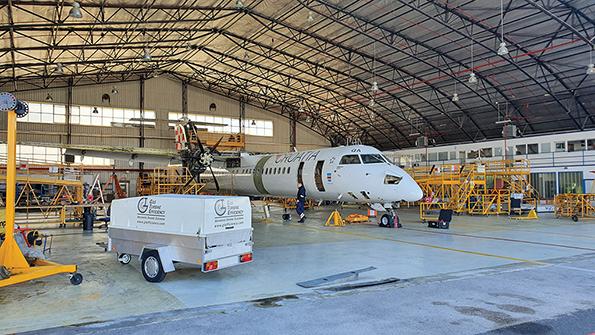
How has the COVID-19 outbreak affected Croatia Airlines’ maintenance operations?
Croatia Airlines Technical Services is maintaining our own fleet and performing line and base maintenance work for our customers. As for the Croatia Airlines fleet regarding the COVID-19 situation, we are adapting to the changes in the flight schedule, following all recommendations from our health authorities by using protective equipment, and working in 14-day schedules with staff operating from home whenever possible. We are continuing to work in hangars with a reduced capacity but are still performing base maintenance work on our aircraft at our base in Zagreb.
What about maintenance work for your third-party customers?
Regarding customer aircraft, we had some slot cancellations in our hangars due to travel restrictions for customers’ crews and technical personnel. Line maintenance has basically stopped for third parties since most airports are closed and most companies have ceased operations. There is some limited line maintenance work still taking place at Zagreb Airport to support our daily flight to Frankfurt and some activity at Brussels, but there has been a complete shutdown at the rest of our line stations. The impact of COVID-19 has been immediate, has been hard and will continue to be so.

Will Croatia Airlines’ maintenance teams undertake any work on the carrier’s grounded aircraft?
We are still performing heavy maintenance on one of our de Havilland Dash 8-400s, but of course with limited capacity. From a manpower perspective, this is taking place with a different shift schedule—that is, minimizing the number of personnel in shifts. We have also faced difficulties in areas such as parts ordering and logistics. We are using this opportunity to perform some engine changes and minor work on the rest of the fleet. Parking and storage procedures will also require some maintenance capabilities during this period.
From a workforce perspective, what measures has Croatia Airlines taken to ensure staff safety?
As already mentioned, we adapted to the COVID-19 situation to completely follow recommendations from our health authorities and company crisis management staff. In every department where working from home is possible, we organized ourselves in a way that allowed work to continue without stopping and that assured the continuing airworthiness of our fleet. Special measures were issued, reducing risks to acceptable limits. For the personnel that need to be at work sites, we organize working times and shift schedules to minimize the number of personnel present during working hours. We also introduced 14-day rotations to allow isolation of staff if necessary.
Will the airline look to do more maintenance in-house?
Our long-term strategy is to perform the majority of work in-house with our own personnel. We invest a lot of resources to maintain a stable but flexible system in our technical department, relying on highly skilled personnel. We are fully capable of performing heavy maintenance on our fleet including six-year and 12-year checks, nondestructive testing, shop work and engineering. However, despite this extreme new situation of closed borders and limited travel, even within cities and within our country, we will continue work on our fleet, to be completely ready when the time comes for our aircraft to fly again.
Are you looking at reevaluating existing maintenance contracts?
Yes, of course. We are in continuous talks with our partners and maintenance providers to find mutually acceptable solutions on how to overcome this difficult and unexpected situation. It is unprecedented that basically a complete industry has ground to a halt in such a short period of a time.
How do you think the MRO industry will change as a result of the coronavirus?
In the first period of recovery, perhaps during the next few months after COVID-19, there will obviously be reduced demand for MRO services due to a decrease in utilization of the worldwide fleet. If the crisis lasts through the whole of 2020, it will probably result in more fleet retirements, which will impact the MRO industry as well. Analysis and predictions regarding MRO capacities and demand that we had previously made need to be re-drawn and adjusted to this new and completely different situation.
In the last few years, we have been facing great demand for MRO services—for instance, extremely high demand for engine shop visits. Many new facilities were opening, and many predictions were made about how much skilled labor the industry would need in the future. Now we see many of the big airlines retiring older aircraft, canceling new orders and reducing their fleets. In our opinion, MRO providers that based their future on steady and continuous growth by developing internal capabilities and—most important—investing in their own personnel will have the knowledge and experience to adapt to the new ball game. Investing in quality, fostering a fair and open relationship with customers and investing in your own people will pay off in the long run. Good planning and teamwork will ensure that we will fly again.



